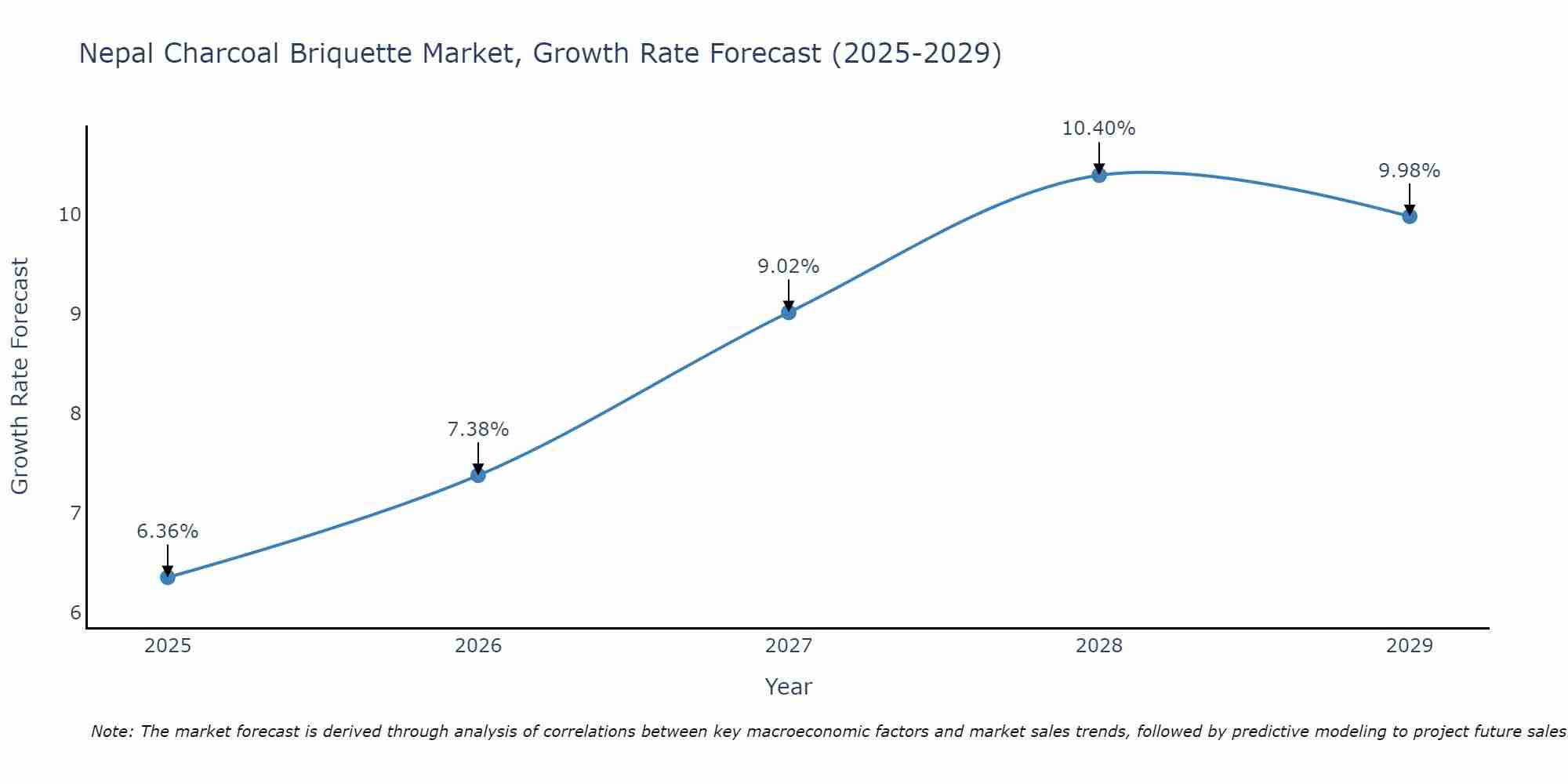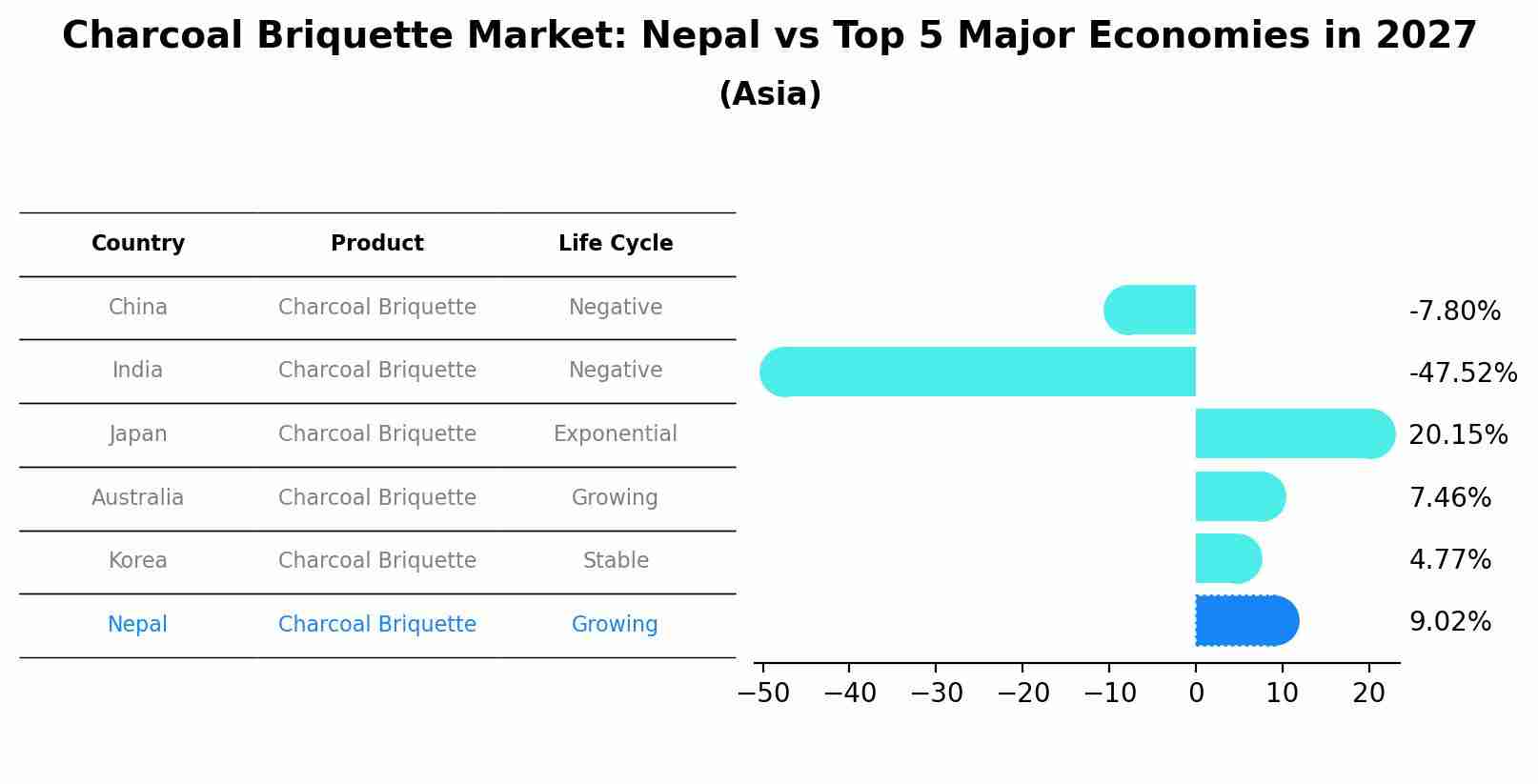Nepal Charcoal Briquette Market (2025-2031) Outlook | Value, Forecast, Size, Analysis, Trends, Companies, Revenue, Growth, Share & Industry
| Product Code: ETC286536 | Publication Date: Aug 2022 | Updated Date: Jul 2025 | Product Type: Market Research Report | |
| Publisher: 6Wresearch | Author: Sumit Sagar | No. of Pages: 75 | No. of Figures: 35 | No. of Tables: 20 |
Nepal Charcoal Briquette Market Size Growth Rate
The Nepal Charcoal Briquette Market is projected to witness mixed growth rate patterns during 2025 to 2029. The growth rate begins at 6.36% in 2025, climbs to a high of 10.40% in 2028, and moderates to 9.98% by 2029.

Charcoal Briquette Market: Nepal vs Top 5 Major Economies in 2027 (Asia)
The Charcoal Briquette market in Nepal is projected to grow at a growing growth rate of 9.02% by 2027, highlighting the country's increasing focus on advanced technologies within the Asia region, where China holds the dominant position, followed closely by India, Japan, Australia and South Korea, shaping overall regional demand.

Nepal Charcoal Briquette Market Overview
The Nepal charcoal briquette market is witnessing growth due to increasing awareness about environmental conservation and sustainable energy sources. The demand for charcoal briquettes is rising as they are considered a cleaner and more efficient alternative to traditional charcoal and firewood. The market is driven by factors such as the government`s initiatives to promote clean energy sources, the growing popularity of outdoor cooking and BBQ culture, and the rising concern about deforestation. Key players in the Nepal charcoal briquette market are focusing on product innovation, quality control, and distribution network expansion to gain a competitive edge. Overall, the market is expected to continue its upward trajectory as consumers increasingly prioritize eco-friendly and renewable energy solutions.
Nepal Charcoal Briquette Market Trends
The Nepal charcoal briquette market is experiencing a growing demand due to increased awareness of environmental sustainability and the shift towards cleaner energy sources. Consumers are opting for charcoal briquettes as a more eco-friendly alternative to traditional charcoal due to their lower carbon emissions and sustainable sourcing. The market is also witnessing a rise in the availability of innovative charcoal briquette products, such as smokeless and long-burning varieties, catering to diverse consumer preferences. Furthermore, government initiatives promoting clean cooking solutions and the ban on traditional charcoal production in some areas are driving the market towards a more sustainable future. Overall, the Nepal charcoal briquette market is poised for continued growth as consumers prioritize environmental conservation and seek cleaner energy options.
Nepal Charcoal Briquette Market Challenges
The Nepal Charcoal Briquette Market faces several challenges such as limited awareness and acceptance among consumers, inconsistent quality of briquettes due to varying production techniques, high competition from traditional charcoal and firewood, lack of infrastructure for distribution and marketing, and limited access to raw materials. Additionally, the industry struggles with environmental concerns related to deforestation and unsustainable sourcing of biomass for briquette production. Inadequate government support, regulatory issues, and the presence of counterfeit products further complicate the market landscape. Overcoming these challenges will require concerted efforts from industry stakeholders, including improved technology adoption, awareness campaigns, quality control measures, and sustainable sourcing practices to drive growth and development in the Nepal Charcoal Briquette Market.
Nepal Charcoal Briquette Market Investment Opportunities
The Nepal Charcoal Briquette Market presents promising investment opportunities due to the increasing demand for sustainable and clean cooking fuel alternatives. With growing awareness about environmental issues and the negative impact of traditional charcoal production on forests, there is a shift towards eco-friendly charcoal briquettes. Investors can explore opportunities in setting up manufacturing plants for charcoal briquettes, establishing distribution networks, and investing in marketing strategies to tap into this emerging market. Additionally, there is potential for technological advancements in production processes to enhance efficiency and quality of charcoal briquettes, further attracting investment in research and development. Overall, the Nepal Charcoal Briquette Market offers a sustainable investment avenue with the potential for growth and profitability.
Nepal Charcoal Briquette Market Government Policy
Government policies related to the Nepal Charcoal Briquette Market focus on promoting sustainable and environmentally friendly practices. This includes regulations to discourage the use of traditional charcoal made from cutting down trees, and instead incentivizing the production and use of charcoal briquettes made from waste biomass. The government provides support for research and development in this sector, as well as financial assistance and tax incentives for businesses engaged in the production and distribution of charcoal briquettes. Additionally, there are policies in place to ensure quality control and safety standards for charcoal briquettes to protect consumers and the environment. Overall, the government`s policies aim to reduce deforestation, mitigate climate change, and promote the growth of a sustainable charcoal briquette industry in Nepal.
Nepal Charcoal Briquette Market Future Outlook
The Nepal Charcoal Briquette Market is poised for steady growth in the coming years as consumers increasingly seek sustainable and clean energy alternatives. With rising awareness about environmental issues and the negative impact of traditional charcoal production methods, there is a growing demand for charcoal briquettes as a cleaner and more efficient cooking fuel. Government initiatives promoting sustainable energy sources and the introduction of innovative production techniques are expected to further drive market growth. Additionally, the increasing availability of raw materials such as agricultural waste and the growing popularity of eco-friendly products among consumers will contribute to the expansion of the charcoal briquette market in Nepal. Overall, the future outlook for the Nepal Charcoal Briquette Market looks promising with opportunities for market players to capitalize on the growing demand for sustainable energy solutions.
Key Highlights of the Report:
- Nepal Charcoal Briquette Market Outlook
- Market Size of Nepal Charcoal Briquette Market, 2024
- Forecast of Nepal Charcoal Briquette Market, 2031
- Historical Data and Forecast of Nepal Charcoal Briquette Revenues & Volume for the Period 2021 - 2031
- Nepal Charcoal Briquette Market Trend Evolution
- Nepal Charcoal Briquette Market Drivers and Challenges
- Nepal Charcoal Briquette Price Trends
- Nepal Charcoal Briquette Porter's Five Forces
- Nepal Charcoal Briquette Industry Life Cycle
- Historical Data and Forecast of Nepal Charcoal Briquette Market Revenues & Volume By Type for the Period 2021 - 2031
- Historical Data and Forecast of Nepal Charcoal Briquette Market Revenues & Volume By Wood Type for the Period 2021 - 2031
- Historical Data and Forecast of Nepal Charcoal Briquette Market Revenues & Volume By Others for the Period 2021 - 2031
- Historical Data and Forecast of Nepal Charcoal Briquette Market Revenues & Volume By Application for the Period 2021 - 2031
- Historical Data and Forecast of Nepal Charcoal Briquette Market Revenues & Volume By Metallurgical Industry for the Period 2021 - 2031
- Historical Data and Forecast of Nepal Charcoal Briquette Market Revenues & Volume By BBQ for the Period 2021 - 2031
- Historical Data and Forecast of Nepal Charcoal Briquette Market Revenues & Volume By Others for the Period 2021 - 2031
- Nepal Charcoal Briquette Import Export Trade Statistics
- Market Opportunity Assessment By Type
- Market Opportunity Assessment By Application
- Nepal Charcoal Briquette Top Companies Market Share
- Nepal Charcoal Briquette Competitive Benchmarking By Technical and Operational Parameters
- Nepal Charcoal Briquette Company Profiles
- Nepal Charcoal Briquette Key Strategic Recommendations
Frequently Asked Questions About the Market Study (FAQs):
- Single User License$ 1,995
- Department License$ 2,400
- Site License$ 3,120
- Global License$ 3,795
Search
Thought Leadership and Analyst Meet
Our Clients
Related Reports
- Canada Oil and Gas Market (2026-2032) | Share, Segmentation, Value, Industry, Trends, Forecast, Analysis, Size & Revenue, Growth, Competitive Landscape, Outlook, Companies
- Germany Breakfast Food Market (2026-2032) | Industry, Share, Growth, Size, Companies, Value, Analysis, Revenue, Trends, Forecast & Outlook
- Australia Briquette Market (2025-2031) | Growth, Size, Revenue, Forecast, Analysis, Trends, Value, Share, Industry & Companies
- Vietnam System Integrator Market (2025-2031) | Size, Companies, Analysis, Industry, Value, Forecast, Growth, Trends, Revenue & Share
- ASEAN and Thailand Brain Health Supplements Market (2025-2031) | Strategy, Consumer Insights, Analysis, Investment Trends, Opportunities, Growth, Size, Share, Industry, Revenue, Segments, Value, Segmentation, Supply, Forecast, Restraints, Outlook, Competition, Drivers, Trends, Demand, Pricing Analysis, Competitive, Strategic Insights, Companies, Challenges
- ASEAN Bearings Market (2025-2031) | Strategy, Consumer Insights, Analysis, Investment Trends, Opportunities, Growth, Size, Share, Industry, Revenue, Segments, Value, Segmentation, Supply, Forecast, Restraints, Outlook, Competition, Drivers, Trends, Demand, Pricing Analysis, Competitive, Strategic Insights, Companies, Challenges
- Europe Flooring Market (2025-2031) | Outlook, Share, Industry, Trends, Forecast, Companies, Revenue, Size, Analysis, Growth & Value
- Saudi Arabia Manlift Market (2025-2031) | Outlook, Size, Growth, Trends, Companies, Industry, Revenue, Value, Share, Forecast & Analysis
- Uganda Excavator, Crane, and Wheel Loaders Market (2025-2031) | Strategy, Consumer Insights, Analysis, Investment Trends, Opportunities, Growth, Size, Share, Industry, Revenue, Segments, Value, Segmentation, Supply, Forecast, Restraints, Outlook, Competition, Drivers, Trends, Demand, Pricing Analysis, Competitive, Strategic Insights, Companies, Challenges
- Rwanda Excavator, Crane, and Wheel Loaders Market (2025-2031) | Strategy, Consumer Insights, Analysis, Investment Trends, Opportunities, Growth, Size, Share, Industry, Revenue, Segments, Value, Segmentation, Supply, Forecast, Restraints, Outlook, Competition, Drivers, Trends, Demand, Pricing Analysis, Competitive, Strategic Insights, Companies, Challenges
Industry Events and Analyst Meet
Whitepaper
- Middle East & Africa Commercial Security Market Click here to view more.
- Middle East & Africa Fire Safety Systems & Equipment Market Click here to view more.
- GCC Drone Market Click here to view more.
- Middle East Lighting Fixture Market Click here to view more.
- GCC Physical & Perimeter Security Market Click here to view more.
6WResearch In News
- Doha a strategic location for EV manufacturing hub: IPA Qatar
- Demand for luxury TVs surging in the GCC, says Samsung
- Empowering Growth: The Thriving Journey of Bangladesh’s Cable Industry
- Demand for luxury TVs surging in the GCC, says Samsung
- Video call with a traditional healer? Once unthinkable, it’s now common in South Africa
- Intelligent Buildings To Smooth GCC’s Path To Net Zero


















